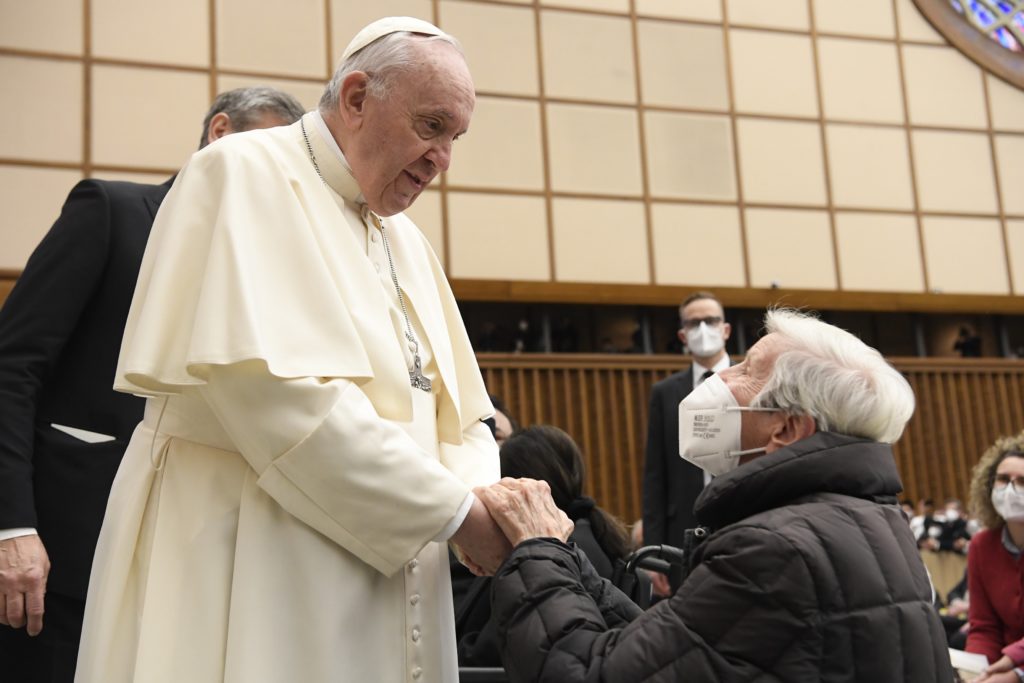Pope Francis decried the excessive “exaltation of youth” on Wednesday as he began a new general audience series on old age.
Speaking at his live-streamed general audience on Feb. 23, the pope noted that as the average age of populations continued to rise, the “elderly are often seen as a burden.”
“The dominant culture has as its sole model the young adult, i.e. a self-made individual who always remains young. But is it true that youth contains the full meaning of life, while old age simply represents its emptying and loss?” Pope Francis asked as he spoke in the Vatican’s Paul VI Hall.
“The exaltation of youth as the only age worthy of embodying the human ideal, coupled with contempt for old age as frailty, decay, disability, has been the dominant image of 20th-century totalitarianism. Have we forgotten this?” he added.
Pope Francis said that youth was beautiful, but cautioned that “eternal youth is a very dangerous illusion.”
“Being old is just as important — and beautiful — is equally important as being young,” he said.
“Let us remember this. The alliance between generations, which restores all ages of life to the human, is our lost gift and we have to get it back. It must be found in this culture of waste and in this culture of productivity.”
The pope announced that his weekly catechesis at the Wednesday audience in the coming weeks would focus on seeking inspiration in the Word of God on the meaning and value of old age. Last week, he concluded his 12-week cycle of catechesis on St. Joseph.
“Let us not forget that in both family and society, the elderly are like the roots of the tree: they have all the history there, and the young are like the flowers and the fruit,” he said.
“Everything beautiful that a society has is related to the roots of the elderly. For this reason, in these catecheses, I would like the figure of the elderly person to come up, to understand well that the elderly person is not a waste material: he/she is a blessing for society.”
Pope Francis said that old age was a gift through which people can share from their maturity and wisdom with others.
“The young must talk to the elderly, and the elderly to the young. And this bridge will be the transmission of wisdom in humanity,” he said.
He expressed concern that young people today would miss out on important lessons, adding that the elderly had a responsibility to share their wisdom with younger generations.
“If grandparents fall back on their melancholies, young people will look even more to their smartphones,” he said.
“The screen may stay on, but life will die out before its time. Isn’t the most serious backlash of the pandemic precisely in the loss of the young? The old have resources of life already lived that they can call upon at any moment. Will they stand by and watch young people lose their vision, or will they accompany them by warming their dreams?”
According to the United Nations, the number of older persons is expected to double by 2050. The global population of people over the age of 60 is already more than twice as large today than it was in 1980.
After delivering his general audience address, Pope Francis made an appeal for peace in Ukraine.
The pope told the large crowd gathered in the Paul VI Hall that he was inviting people to fast for peace on March 2, Ash Wednesday, praying that “the Queen of Peace will preserve the world from the madness of war.”
He then addressed Italian-speaking pilgrims, saying: “Today we celebrate the liturgical memory of St. Polycarp, disciple of the Apostles and the bishop of Smyrna. May his fidelity to Christ, even to his martyrdom, arouse in each one the desire to follow the Divine Master by generously cooperating in his work of reconciliation and peace.”

